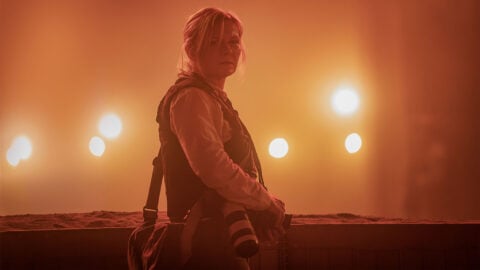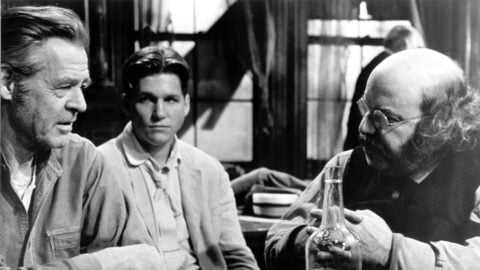Film of the Week: Full Moon in Paris

For me, watching Eric Rohmer’s 1984 film Full Moon in Paris—Les Nuits de la Pleine Lune, re-released this week—was a pure dose of that fabled malady, Proustian Rush. This is one of those Rohmer films that capture their particular moment perfectly, in this case 1980s Paris in its high phase of post-modernist chic. You might think of Rohmer as a quintessential Sixties and early-Seventies director because of his Moral Tales series, but for me he embodies French cinema in the Eighties. It’s partly because that’s when I started to spend a lot of time in Paris (and therefore, inevitably, at the movies), and partly because of Rohmer’s extremely regular output in that decade; it feels as if I measured the passage of the Eighties in episodes of his six-film series “Comedies and Proverbs,” made between 1981 and 1987.
Not all Rohmer films are tied indissolubly to their moment. The first in that series, The Aviator’s Wife (81), with its landscape of parks, cafés, and bedsits, is set in a Paris that would not have been so different two decades earlier, while some of his later films, including episodes in the “Four Seasons” series (90-98), could easily be made today without much discrepancy. But Full Moon in Paris* is entirely a snapshot of its instant. Visually and sonically, 1984 is present throughout. It’s there in the music, a frothy neo-yé-yé electro-pop score by duo Elli and Jacno, alumni of pioneering French punk band Stinky Toys (singer Elli Medeiros is glimpsed dancing in a party scene). And it’s there in the décor: grey walls, Mondrian prints, “witty” lamps (heroine Louise is a trendy creative who makes her own lights, presumably because she’s unable to afford Memphis creations). Other design touches include the neo-classical pillar in Louise’s apartment, and novelty furnishings like the trompe l’oeil sofa at her workplace (at first, I thought it was held together by masking tape, then realized it was painted to resemble the table in front of it, complete with vase of flowers—oh, that crazy design decade).
This is also entirely a film of its time in its depiction of Louise, who is Mademoiselle 1984 to the hilt. Full Moon in Paris is one of the rare Rohmer films to feature a fully-fledged star—by contrast to “Comedies and Proverbs’ actresses like Béatrice Romand and Marie Rivière, who seem to have wandered in off the street, and prove absolutely riveting and memorable. But Full Moon features a star insofar as its heroine is herself a star, a charismatic scenester whose problem, she complains, is that everyone loves her too much, which doesn’t leave her much time to herself. Louise’s life seems to be a permanent, hyper-elegant performance, as witness the way she’s constantly positioning herself, head cocked just so against walls and in doorways. And yet, this performance seems absolutely natural and artless; as well as elegant, Louise is also oddly gauche, in the way that only hyper-sophisticates can be.

Louise is played—or since the fit is so close, perhaps it’s better to say embodied—by the late Pascale Ogier, who was 25 when she made the film. The daughter of Bulle Ogier, Pascale memorably teamed up with her mother to co-write and star in Jacques Rivette’s enigmatic psychogeographical romp Le Pont du Nord (81); playing a motorbiking free spirit and tracker of conspiracies, she comes across as at once leather-tough, otherworldly, and impishly comical. She then appeared in arguably the ultimate intellectual-chic oddity of the decade, Ken McMullen’s essay/fiction Ghost Dance (83), in which she quizzes Jacques Derrida on the nature of ghosts. After that, Pascale made Full Moon in Paris, which won her the Best Actress award in Venice—shortly before she died in October 1984 of an overdose-related heart attack, the day before her 26th birthday.
So Full Moon in Paris is deeply poignant to watch again, especially, if like me, you had it bad for Ogier at the time. In 1984, she seemed impeccably glamorous, in a witty, wildly offbeat way; seen today in Full Moon, she looks oddly awkward and childlike, especially with that high-pitched sing-song voice that some French actresses (but by no means all) contrive to use to great effect. The clothes that seemed so cool, by the then modish but accessible design house Dorothée bis, look faintly ridiculous now—the flat shoes, bulbous sack-like coats, oddly tapered trousers. Add to that the vast bouffant hairstyle tied with a Minnie Mouse bow, somewhere between Versailles and early Madonna, but now irresistibly suggesting Seinfeld’s Elaine, some five years early.
In many ways, Full Moon in Paris is a portrait of Pascale Ogier’s moment, and of her personality and taste. She created her own interior designs for the film, using works by designer friends, and one assumes she was largely responsible for the prominent use of Mondrian prints—an artist whom Rohmer disparagingly said at the time had come to be seen as “more of a design accessory than a painter.”

Full Moon in Paris is an account of the sort of dilemmas that a woman like Louise, or Pascale, might have faced in Paris at the time, balancing the demands of autonomy, hipness, and having a love life. An intern in a design company located in the upmarket Place des Victoires (in the same building as Kenzo’s HQ, one shot reveals), Louise lives with her older boyfriend Rémi (Tchéky Karyo), an urban planner, in the drab new town of Marne-la-Vallée—which DP Renato Berta makes resemble nothing more or less than a lunar wasteland in the opening and closing shots. Rémi is a physical type, first seen working out on their balcony, but prone to stay at in the evenings, while Louise likes to go to parties in town and occasionally spend the whole night out (chastely, it’s suggested—for the moment, at least). But Louise doesn’t seem sure whether she wants Rémi to accompany her on her sorties, or to give her space; apparently, she wants both, and neither. She’s always saying she wants solitude, yet doesn’t seem happy being alone; too popular for comfort, she’s the opposite of Delphine in The Green Ray (86), who yearns for company but backs off whenever anyone invites her on holiday.
Meanwhile, Louise keeps her options open by retaining her Paris apartment as a pied à terre. To complicate matters, she’s invariably accompanied by writer Octave (Fabrice Luchini), a platonic pal who doesn’t want to stay platonic. A highbrow (ostensibly) unthreatening best male buddy, he is to Louise somewhat as Duckie was to Molly Ringwald’s Andie in Pretty in Pink—at once her confidant, flattering courtier, resident highbrow jester, and her “walker” at parties, where she’s likely to go off and dance with more muscular types. Octave is what, in a 17th- or 18th-century French comedy, would have been called Louise’s “follower”—but he wants to be more than that, as becomes apparent when he starts disparaging her taste in men, while slyly, fondly stroking her arm.
While Ogier’s untimely death leaves her frozen in her moment, it comes as a rather comical shock to see the slender, effete, youngish (33-year-old) Luchini here—then just settling into his career of playing pompous, self-deluding intellectuals, but decades and a whole different body away from the boorish, bourgeois patriarch of François Ozon’s Potiche (10) or the grizzled grandee of French theater (famed, among other things, for his staged readings of Céline and other literary texts). Luchini’s Octave is charming, comical, absurdly mannered as he widens his eyes and declaims the sort of finely carved but hollow nonsense that Rohmer characters often spout when they think they’re being insightful and original—but does Octave really believe that he’s the first person to suggest that cities are more restful than the country, or the first to come up with the idea of writing in cafés?

However, Octave (whose name inescapably evokes the morally tainted social gadfly that Jean Renoir played in The Rules of the Game) is more than ridiculous. He is, I’d argue, the only out-and-out villain in Rohmer’s films. Watching Full Moon in Paris again, he now strikes me as quite loathsome. It’s not only because, married as he is, he comes on to Louise in his apartment, with his daughter and her babysitter on the premises—it’s also because he’s so unpleasantly high-handed with that babysitter. But he’s also filled with self-congratulatory contempt for others, showing a monstrous sense of his own superiority when he sneers at her penchant for men of “an animality that’s pathetically bestial.” Just because he’s forever stopping to jot down his pensées in a notebook doesn’t mean that he’s not pathetically bestial himself—as his increasingly frequent lunges at Louise make clear.
Then there’s the villainous stroke he pulls off when out in a café with her. Louise has just spotted Rémi on the premises, and when she tells Octave, he says he’s pretty sure that Rémi was with Louise’s friend Camille (Virginie Thévenet). At least, he thinks it was Camille, but he can’t be sure: “I have a selective memory—I don’t remember people who bore me.” You really want to see Octave get a kicking, but the only violence in the film—and, so far as I can remember, in any Rohmer film—is Rémi literally beating himself up in frustration at his and Louise’s inability to communicate.
Things come to a head when Louise finally hooks up with sax player Bastien, played by Christian Vadim in a sleeveless T-shirt and a Billy Idol sneer. Bastien’s preposterous cool marks him out as one of those bestial boys that Louise can’t resist; early on, in a terrific extended dance-floor shot, he and Louise slowly, unfailingly gravitate towards each other, driven by the common certainty that they’re the sexiest people present. Eventually Louise has a wild night with Bastien—but that only sends her off restlessly pacing the moonlit Paris night. Taking refuge in a café, she ends up listening to words of wisdom from a chance confidant (Nouvelle Vague stalwart Laszlo Szabo) and expressing her plight in concisely geographical manner: once convinced that her suburban apartment was a place of exile, Louise says she now feels exiled in Paris, while it’s Marne that suddenly seems like the centre of things.

The comedy plays out in a way that’s finally tragicomic, with Louise seemingly hoist by the petard of her contradictory desires. There’s irony but no cruelty here; Rohmer is not making Louise the butt of the joke or saying “serve her right.” It’s simply in the nature of stories illustrating a proverb that someone is bound to suffer from the principle at stake. Louise simply incarnates the plight of an attractive, intelligent, independent Parisian woman of her time, following her own will, but coming uncomfortably to terms with the fact that a lot of people want her too, and not always in a way that suits her. Louise’s chic furnishings reminded me of the John Cooper Clarke lines—“Just a tiger rug and a telephone / Say a postwar glamour girl’s never alone”—except here it’s an angular neon lamp and a grey telephone to match the walls. For Ogier’s postmodern glamour girl, never being alone is her curse, and finally her tragicomic lesson—but, because of Rohmer’s characteristic empathy, decidedly not her punishment.
*The fourth in the “Comedies and Proverbs” series, Full Moon in Paris claims to illustrate the dictum, “He one who has two wives loses his soul, he who has two houses loses his mind”—which appears to have been entirely made up by Rohmer.







